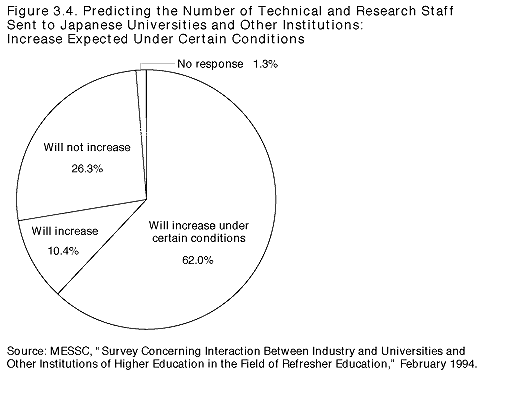| Home > Policy > White Paper, Notice, Announcement > White Paper > JAPANESE GOVERNMENT POLICIES IN EDUCATION, SCIENCE, SPORTS AND CULTURE 1996 > Priorities and Prospects for a Lifelong Learning Society Chapter 3 Section 2 3 | ||
In addition to emphasizing contemporary issues the Lifelong Learning Council recognized, the acquisition of work-related knowledge and skills is an extremely important learning priority for contemporary society, which is experiencing rapid change in the types of knowledge required. Structured, ongoing learning activities are essential in this area, and in many cases the levels of learning required are very advanced. In future the need for structured, ongoing learning is expected to expand to include not only work-related fields but also such areas as hobbies and general cultivation. Institutions of higher education are therefore likely to become the focus of rising expectations.
According to the 1996 MESSC survey, for example, the priority for most people studying at institutions of higher education under adult admission, special register student, or special non-degree student systems is the acquisition of work-related knowledge and skills. The survey results also show that most of these people are eager to continue their studies at institutions of higher education and advance to higher levels.
The analysis of worker training and education and self-improvement activities in chapter 2 reveals that institutions of higher education are used relatively little for these purposes. This does not necessarily mean that there is little need for such institutions in this area. In February 1994 MESSC surveyed the personnel and education departments of corporations about interaction between industry and universities and other institutions of higher education in the field of refresher education. Of the companies surveyed, 10.4% predicted that the number of technical and research personnel sent to Japanese universities and other institutions of higher education would increase, while 62.0% thought the number would increase under certain conditions ( Figure 3.4 ).
In the 1996 MESSC survey, greater access to universities and junior colleges was the condition cited by many participants in extension courses (30.5%) as a condition for continuing to more advanced levels of learning. This response also gained relatively high scores among people already enrolled in graduate schools (8.5%) and universities (13.9%) ( Figure 3.1 ).
The facts that people already studying at institutions of higher education want them to be more open and that the majority of people studying there want to continue their studies suggest that institutions of higher education are the focus of great expectations among people involved in learning activities. These expectations are likely to intensify as such institutions become more open to the community.
Institutions of higher education have already made some efforts in response to these expectations. As outlined in chapter 2, section 1, more and more people are studying at such institutions. As pointed out in the 1996 report of the Lifelong Learning Council, however, even in universities that welcome adult students efforts are frequently limited to only a few staff members, while the attitudes of the teaching staff as a whole remain unchanged. Thus it is necessary to improve universities' internal organizational structures and modify staff attitudes.
The priorities for institutions of higher education as they endeavor to foster closer links with the community and contribute to community development include the improvement of internal organizational structures, the development of systems for coordination and cooperation with local industry and government agencies, and the creation of systems enabling them to actively seek the views of the wider community when accepting adult students. The creation of such systems is facilitated by the Recurrent Education Promotion Program, which was initiated in fiscal 1991, and by various measures to encourage refresher education. Efforts are needed to ensure that achievements in these areas are fully utilized and that similar measures are implemented in all regions.

| Back to Top | MEXT HOME |